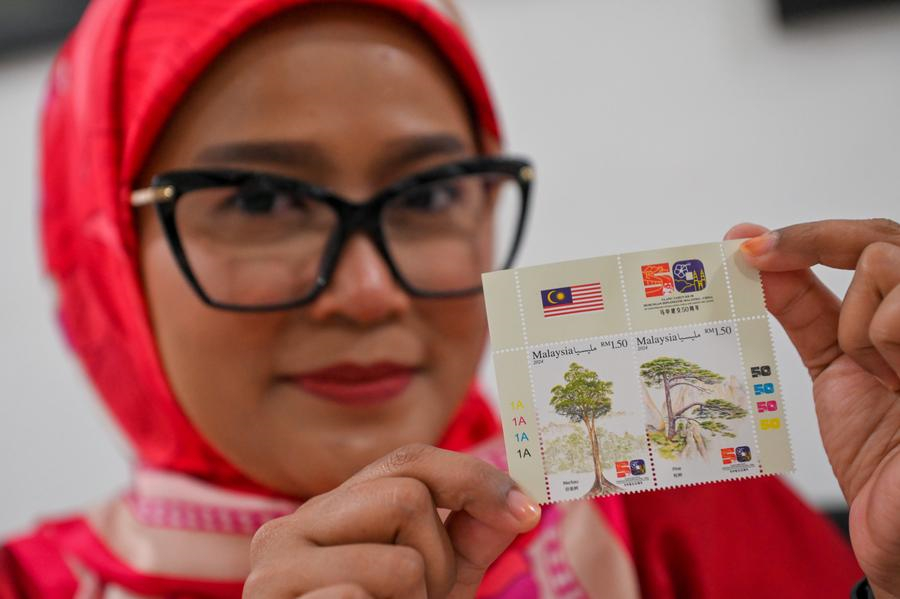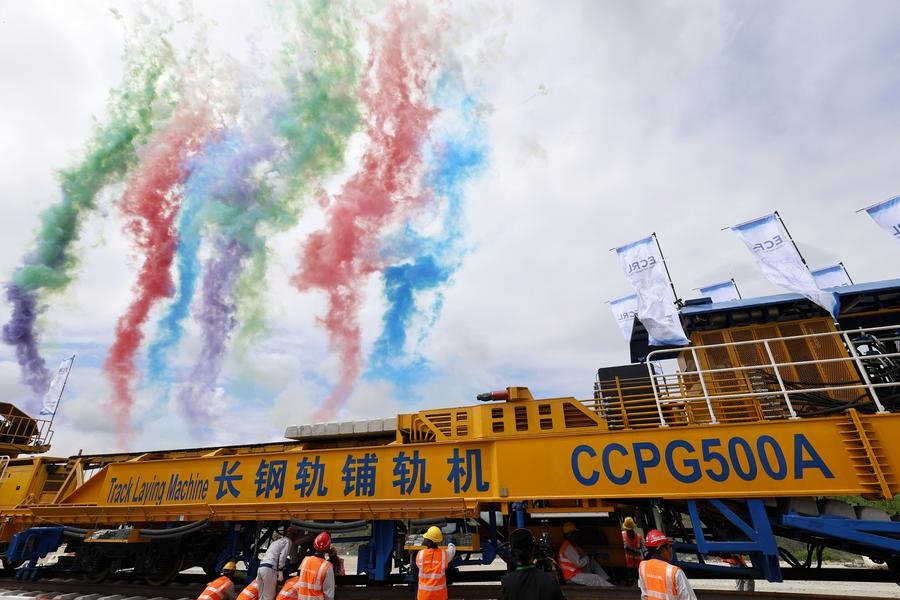Cooperation brings stability, prosperity to Asia-Pacific

A person shows stamps marking the 50th anniversary of the establishment of diplomatic ties between Malaysia and China in Kuala Lumpur, Malaysia, May 31, 2024. [Photo by Chong Voon Chung/Xinhua]
* Around a decade ago, bilateral relations received a significant boost when Chinese President Xi Jinping visited New Zealand, elevating their ties to a comprehensive strategic partnership.
* Reflecting on history, China and Australia have long been forging ahead side by side. Diplomatic ties were established in December 1972 and were elevated to a comprehensive strategic partnership in November 2014.
* Over the past 50 years, China and Malaysia have always treated each other with sincerity, supported each other in solidarity, and sought development together. This mutual respect and trust have consistently placed China-Malaysia relations at the forefront of regional cooperation.
by Xinhua writers Tian Dongdong, Ye Shan, and Feng Qidi
BEIJING/HONGKONG -- Around 2024, the diplomatic ties between China and New Zealand, Australia, and Malaysia have all crossed the half-century mark. Throughout this journey, China has shown unwavering dedication to collaboration, even amid challenges.
In the ever-shifting geopolitical dynamics of the Asia-Pacific region, China's ties with New Zealand, Australia, and Malaysia are expected to showcase the influential role of diplomacy rooted in mutual respect and mutual understanding. This will contribute to injecting greater sustainability and stability into the region.

Tourists take selfies in front of a dragon-shaped installation to welcome the Chinese Lunar New Year at Hagley Park in Christchurch, New Zealand, Feb. 9, 2024. [Photo by Meng Tao/Xinhua]
FRUITFUL COOPERATION
From June 13 to 20, Chinese Premier Li Qiang will pay official visits to New Zealand, Australia and Malaysia.
Fostered by pioneers like Rewi Alley, a dedicated New Zealander who spent six decades living and working in China until his passing in Beijing in 1987, the relationship between China and New Zealand has steadily grown since they established diplomatic ties about 52 years ago.
During this period, the two countries have created many "firsts." New Zealand was one of the first Western countries to establish diplomatic relations with China and the first developed nation to sign and implement a bilateral free trade agreement with China. Additionally, it was also the first Western developed country to recognize China's full market economy status.
"It's a reflection of the New Zealand culture, as well as its political position of being strongly independent without having to follow necessarily the strong influence from other countries. To recognize China in these 'first ways' is a showing of strength and independent thinking," John Cochrane, chairman of the New Zealand China Trade Association, told Xinhua on Wednesday.
Around a decade ago, bilateral relations received a significant boost when Chinese President Xi Jinping visited New Zealand, elevating their ties to a comprehensive strategic partnership.
As a result of their cooperation featuring win-win results, China has become New Zealand's largest trading partner and export destination. Notably, New Zealand has long enjoyed a surplus for goods and services with China, with only three quarterly goods deficits in the five years ending June 2023.
"I cannot help but use the word 'vital' when I think about the importance (of New Zealand's relationship with China). It is a vital relationship not only just in trade, but in all matters whether it's a national security, whether it's on education, people exchanges, cultural exchanges, artistic exchanges, and so on," said Cochrane.
Characterized by mutual respect and win-win cooperation, the sustained momentum in their bilateral ties has served as a stabilizing force in the ever-changing global landscape.
China's rapid development presents vast opportunities and is beneficial to many countries including New Zealand. "China shows a model that it (development) can be accomplished," said Cochrane.
"The cooperation between China and New Zealand is in a good condition. The relationship between the two countries is ready now for us to start that next level of success," he added.

Visitors and an exhibitor communicate during the AliExpo 2024 in Sydney, Australia, March 15, 2024. [Xinhua/Ma Ping]
WARMING-UP TIES
Australia marks the second stop of Premier Li's trip.
Reflecting on history, China and Australia have long been forging ahead side by side. Diplomatic ties were established in December 1972 and were elevated to a comprehensive strategic partnership in November 2014.
However, during the recent six-year period of strained bilateral relations, some within the Australian political sphere adopted unfavorable policies toward China, influenced by external factors. This led to a series of unfriendly actions, including supporting Taiwan to be included in the World Health Assembly and joining the AUKUS alliance with the United States and Britain.
It was not until 2022, when President Xi met with Australian Prime Minister Anthony Albanese on the sidelines of the G20 Summit in Indonesia, that bilateral relations gradually returned to a right track.
Through consultations and negotiations, many trade disputes have been resolved. In April, Australia terminated its anti-dumping measures against Chinese wind towers after the World Trade Organization ruled that Australian duties on Chinese steel products were flawed, and China has lifted anti-dumping measures on Australian barley and wine, as well as lifted bans on several Australian beef and lamb exporters.
The economic structures of China and Australia are highly complementary, and there is huge potential for economic and trade cooperation, said Chinese Ambassador to Australia Xiao Qian.
Since 2009, China has been Australia's largest trading partner, export market and import source for 15 consecutive years. In 2023, the bilateral trade in goods increased 4.1 percent year by year, while Australian investment in China increased 11.7 percent compared to the previous year, and the number of Australian-funded enterprises established in China surged by 40.2 percent.
"Facts have proven that strengthening China-Australia economic and trade cooperation will bring tangible benefits to the business communities of both countries, effectively promote steady economic growth and benefit the two peoples," Xiao said.
"Economic complementarity lies at the heart of the bilateral relationship. A focus on areas of common beneficial interest is conducive to a positive atmosphere for dialogue to continue to broaden and enhance the bilateral relations," said Warwick Powell, adjunct professor at the Queensland University of Technology.
Echoing this sentiment, Daryl Guppy, an international financial technical analysis expert and a former national board member of the Australia-China Business Council, said, "The Chinese and Australian economies are complementary, and bilateral trade cannot be separated from the steady growth of the Chinese economy."

This photo shows the launching site of the East Coast Rail Link project, a mega rail project in Malaysia being built by the China Communications Construction Company (CCCC), in Kuantan, Malaysia on Dec. 11, 2023. [Photo by Chong Voon Chung/Xinhua]
LONG-TIME FRIENDS
China and Malaysia are neighbors with a millennium-old friendship.
In the 15th century, during the time of the Malacca Sultanate and the Ming Dynasty, the ships from China arrived at the port of Malacca. They brought not only silk and porcelain but also the promise of friendship. This historic exchange laid the foundation for the ties between the Chinese and Malaysian people.
As China and Malaysia celebrate the 50th anniversary of their diplomatic relations in 2024, the echoes of that ancient trade resonate strongly. "Malaysia and China are connected by history, trade, and cultural contacts over thousands of years," said Dato' Abdul Majid Ahmad Khan, former Malaysian ambassador to China.
Over the past 50 years, the two nations have always treated each other with sincerity, supported each other in solidarity, and sought development together. This mutual respect and trust have consistently placed China-Malaysia relations at the forefront of regional cooperation.
Economic collaboration remains a cornerstone of this partnership. Last year, bilateral trade reached an impressive 190 billion U.S. dollars, securing China as Malaysia's largest trading partner for the 15th consecutive year.
Signature projects under the Belt and Road Initiative (BRI), such as the East Coast Railway Link and the Malaysia-China "Two Countries, Twin Parks," have significantly strengthened regional connectivity and economic integration between China, Malaysia, and ASEAN as well. "The Belt and Road Initiative has elevated our partnership," noted Majid, highlighting the transformative impact of these projects.
Recent years have seen even greater advancements in bilateral cooperation. The recent visa-free travel waiver has significantly boosted people-to-people exchanges. "We are positive about reaching over 5 million tourists from China," said Tourism Malaysia Director-General Manoharan Periasamy in April.
Malaysia has also attracted substantial investment from China in solar module manufacturing, electric vehicles and the digital economy. Cooperation with China in those fields is crucial, said Majid.
In 2023, President Xi and visiting Malaysian Prime Minister Anwar Ibrahim reached a significant consensus on jointly building a China-Malaysia community with a shared future in Beijing, marking a new historical stage in bilateral relations. This deep-rooted friendship has consistently placed China-Malaysia relations at the forefront of regional cooperation, fostering mutual trust and respect.
On the South China Sea issue, the Malaysian prime minister has called for "aggressive" diplomatic engagement to resolve disputes, rejecting interference of external parties. Reiterating that the issue must be resolved among ASEAN member countries and China, he said earlier this month, "there should not be involvement with other parties because it will be deemed to be more complex and will complicate the matter."
Commenting on the relationship, Nurul Izzah Anwar, vice president of Malaysia's People's Justice Party, told Xinhua in a recent interview, "It's more than just trade ties. It's more than economic linkages. It's an appreciation that we speak to common ideals, common aspirations, and a shared future for the betterment of not just economy and GDP per capita alone, but the betterment of people-to-people connection."
Xinhua reporters Zha Wenye in Hong Kong, Guo Lei and Li Huizi in Wellington, Zhang Jianhua in Canberra, Liang Youchang and Wang Qi in Sydney, and Mao Pengfei and Wang Yi in Kuala Lumpur also contributed to the story.
























